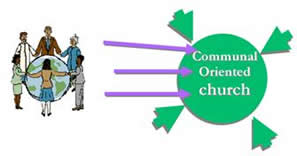In the previous article, a missional church was  defined as the communal relationship between followers of Christ which stems from intentional gospel transformation in the world (outward orientation). In contrast the more prevalent communal
defined as the communal relationship between followers of Christ which stems from intentional gospel transformation in the world (outward orientation). In contrast the more prevalent communal  oriented church can be defined as the communal relationship between followers of Christ as an expression of the transforming power of the gospel (inward orientation). This article will explain why FEBInternational is seeking to plant missional churches as opposed to communal oriented churches.
oriented church can be defined as the communal relationship between followers of Christ as an expression of the transforming power of the gospel (inward orientation). This article will explain why FEBInternational is seeking to plant missional churches as opposed to communal oriented churches.
Missional Drives Communal
The point is not that “missional is good and communal is bad.” What is the benefit of working on roads if there are no gas stations? How can a new believer grow in Christ without the support of other Christians? Every church must have both missional and communal components. However, even though a missional orientation will result in communal expressions, the converse is not necessarily true. One pastor put it this way, “If you are missional oriented, you will have communal focus. But if you are communal oriented, you can lose the missional focus.”
A missional church cannot survive without a communal expression. It cannot fulfill its vision of participating in God’s mission to the world without healthy relationships in the body of Christ. But for this model of church, organized expressions of body life are evaluated and prioritized based on their ability to enhance the missional orientation. The inherent danger of having a communal focus as the primary orientation is the tendency to relegate missional concerns to a lower priority and view them as a means to church growth rather than the essence of the church. Unfortunately, a communal oriented church can continue to function without relevant and significant impact within the surrounding community.
Dowsett’s comment is worth repeating:
The church has always ebbed and flowed, but whenever it has become preoccupied with itself and lost sight of its missionary calling, it has lost its way. Sometimes it has disappeared from view, as with the North African churches in the early years of the rapid expansion of Islam. Sometimes it has become a hollow and spiritually powerless institution, as with some of the European churches in the past two hundred years. On the other hand, whenever it has turned out towards the world with a missionary heart, seeking to bring the gospel of Christ to those outside the church’s it has recovered its meaning for being. For in reaching out in love and longing, it has begun to beat again with the heart of God, it has begun once again to reflect the character of the God in whose name it stands. The church that is not missional is no church at all. Our seeking and finding is a mirror reflection of God doing just the same—and ahead of us. We seek and find, because God first sought and found.1
Living in the world
When the goal of a local congregation is church growth with an inward communal orientation, outreach often consists of removing people from their natural environment and bringing them into the controlled environment of the church in order to teach them how to be Christian. A missional orientation avoids this extractionist thinking and sees the world as the locus of church activity, empowering people to be impacting followers of Christ in a variety of settings outside the four walls of the church.
As mentioned in the previous article Karen and I spent a number of years seeking to plant a communal oriented church in the Sindhi context. We sought to develop a controlled environment in which people could be taught God’s word and faith in Christ would be pre-eminent. This attempt failed. However, during this period one of the believers, Nathaniel 2, shared with me that one of his favorite passages was Noah and the ark because, “just as God used Noah to save his family, so he wants to use me to save mine.” This missional vision resulted in the establishment of a house church among his extended family. We discovered that in a context where churches do not play a significant role in the community, the goal of a local body of believers is not to bring people into the church, but to bring Christ into people’s lives. When a missional passion exists within people’s lives as they live in the world, the church of Jesus Christ emerges in new ways and unique places.
Living on the Margins

FEBInternational personnel work in areas where the church is not central to the society, but survives on the margins. These societies function without taking into consideration the values and concerns of local churches. A missional orientation as the primary focus of a church is required wherever the society functions with the understanding that the church is insignificant in fulfilling the purposes of the community.

A communal orientation as the primary focus of a church is valid when the church is the major player in shaping the values and decisions of society. For example, one of our FEBBC churches had such a popular youth program that the local high school would not make any plan without first checking to see that the dates did not conflict with the program of the church. It is imperative that church leaders exegete their context and understand which orientation is required so that the purposes of God in their setting can be fulfilled.
Practical applications of both Orientations
The following examples demonstrate how a church’s orientation, whether communal or missional, determines its activities.
- Soccer moms at their children’s games on Sunday morning
Communal: We need to “help them prioritize their lives so that their spiritual needs come first” (said by a pastor in a sermon indicating that they should be in church).
Missional: We need to help them become soccer moms who are impacting servants of God as they stand on the field.
- Cyclists who ride on Sunday morning
Communal: We need to get them off their bikes and into the pews (The idea of “filling the pews” was recently said by a pastor in a morning service).
Missional: We need to help cyclists become people serving God as they ride their bikes.
- Seeker sensitive
Communal: Inviting people into a comfortable, nonthreatening environment.
Missional: Going where people are comfortable. My wife, Karen, and daughter, Becky, belong to a karate club and members often visit the pub after a session. In this environment significant spiritual conversations have occurred.
- Coffee bar in the lounge
Communal: A place in the church lounge to chat with people who attend the worship time.
Missional: The local Starbucks (i.e., a neutral environment).
- Children’s programs
Communal: Awana (i.e., within the controlled environment of the church).
Missional: Boy Scouts and Girl Guides (i.e., being an influence for Christ in a setting that is not conducive to overt expressions of faith).
- Church Planting
Communal (quotes from church planters):
“We need a core of people committed to coming each Sunday.”
“I am discouraged because people don’t want to meet together for church.”
“People are showing interest. We are now working on getting them to church.”
Missional (examples from cross-cultural ministries):
Asia: medical ministries open doors for visitations and the beginning of home churches.
Asia: Men are challenged to be spiritual leaders in their extended families in order to begin churches where the people live.
Philippines: A worship service is held in a restaurant to meet the spiritual needs of the staff.
- Building
Communal: There is a high priority given to a place to meet. Buying property is considered essential and a sign of church establishment and growth.
Missional: A building is optional and is considered only as it benefits the missional purpose in the extended community.
- Prayer
Communal: “Please pray that our outreach event would be used by the Lord to cause the church to grow” (from a prayer letter).
Missional: “Please pray that our church would be used of God to make a transforming difference in people’s lives.”
- Pubs
Communal: A church group purchases a pub and transforms it into a place of worship.
Missional: A teetotalling Christian becomes a manager of a pub in order to minister to the patrons 3.
The following article will provide a biblical foundation for the concept of the missional church.
- _______________
- (1) R. Dowsett, “Reaffirming the Missional Heart of God” in Connections, January – April, 2004, 14-15.
- (2) Not his real name.
- (3) See “A Tale of Two Pubs” in M. Frost & A. Hirsch, The Shaping of Things to Come: Innovation and Mission for the 21st Century Church (Peabody: Hendrickson, 2003), 9-11.
